|
Limitar tu búsqueda
[+–] Compilador o editor
- Aguilera, Nelly (6)
- Durán, Luis (5)
- Garro, Nora (1)
- Hernández Sánchez, José Antonio (1)
- Martínez, Gabriel (3)
- Meléndez, Jorge (1)
- Palmero Zilveti, Olga (2)
- Reyes Godelmann, Iker (2)
- Suárez, Rosa María (1)
- Valencia, Anel (1)
[+–] Editorial
[+–] Fecha
[+–] Formato
[+–] Idioma
[+–] Tipo de documento
[+–] Tipo de recurso
[+–] Classification
|

|
|
Introduction (about an international conference on "The effects of migration on sending countries")
The Inter-American Conference on Social Security (CISS) and Universidad Iberoamericana (UIA) co-hosted an international conference on “The Effects of Migration on Sending Countries” in February of 2006. The major objective of the conference was to examine a variety of channels through which migration affects the sending countries. Migrants change the dynamic of sending households; alter labor...
|
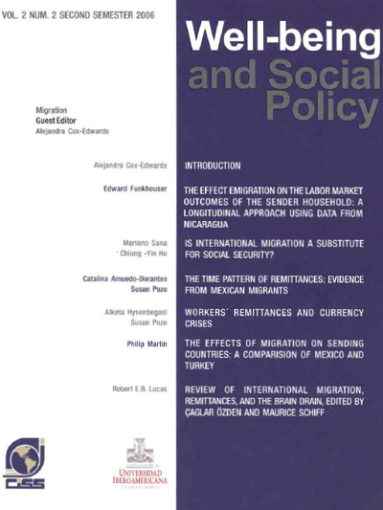
|
|
|
|

|
|
The Americas Social Security Report 2006 The challenges of aging and disability: employment and insurance, and international social security agreements (book review)
The 2006 Issue of the Report on Social Security in the Americas is divided in four chapters. The first two chapters address older-adult issues, the third chapter deals with disability-related problems, and the fourth chapter discusses Social Security agreements in the Americas. In the Presentation, it was pointed out that the objective of the Report on Social Security in the Americas is to become...
|
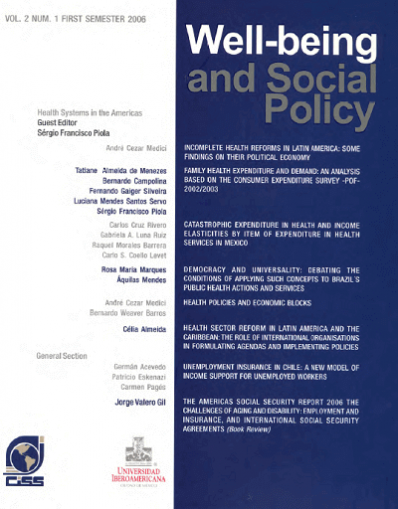
|
|
|
|

|
|
Unemployment insurance in Chile: a new model of income support for unemployed workers
This paper describes the Chilean experience concerning the implementation of a new unemployment insurance (UI) program. The use of individual savings accounts and private management are essential elements. In addition, a redistributive fund (Common Fund) helps workers pool risks, distributing resources from employed to unemployed workers and from stable firms to workers with low incomes and...
|
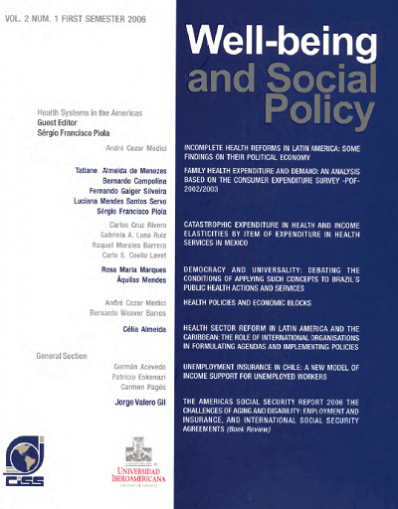
|
|
|
|

|
|
Health sector reform in Latin America and the Caribbean: the role of international organisations in formulating agendas and implementing policies
This article examines health sector reforms in Latin America and the Caribbean to discuss the ideological, theoretical, and conceptual elements that inform the reform agenda and the models put forward for attaining greater equity in the region’s countries. Its starting assumption is that the relevant literature generally neglects the economic, social, and political aspects underlying the...
|
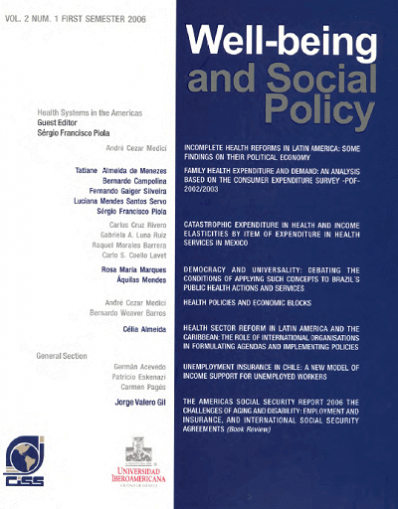
|
|
|
|

|
|
Health policies and economic blocks
This paper analyzes the roles of health goods and services markets within the regional integration process. It is a known fact that the consolidation of integrated markets is slower regarding social goods and services (as health and education) than among other goods and services (e.g. durable consumption goods). The paper discusses the nature of the health sector and its global dimension, showing...
|
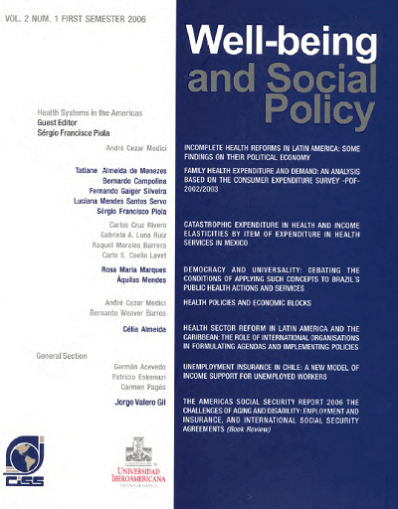
|
|
|
|

|
|
Conflict and power: the teachers' union and education quality in Mexico
The teachers union in Mexico, or Sindicato Nacional de Trabajadores de la Educación (SNTE) represents over 1 million members and is the largest in Latin America. This study uses data from the national student tests administered by the Instituto Nacional para la Evaluación de la Educación (INEE), along with data from the Mexican Ministry of Education and other sources, to investigate the...
|
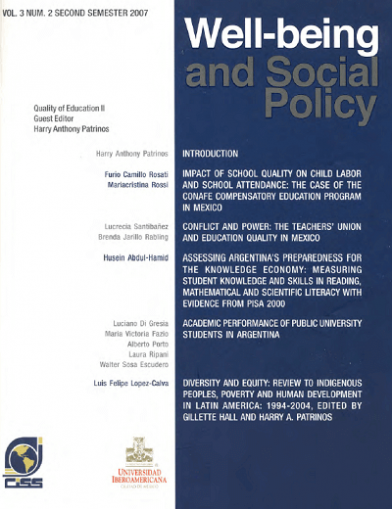
|
|
|
|

|
|
Academic performance of public university students in Argentina
Designing educational policies under limited budgets requires a thorough analysis of the impact of alternative factors on student performance. This work aims at providing an analysis of the relationship between university performance and its explanatory factors. The analysis Will focus on the Argentinean case, using the 1994 Census of Students in National Universities, which includes data on all...
|
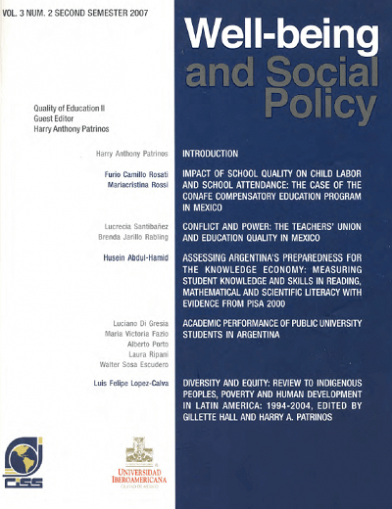
|
|
|
|

|
|
Catastrophic expenditure in health and income elasticities by item of expenditure in health services in Mexico
The objective of this article is to put in economic perspective the expenditure in health within the pattern of family expenditure of the Mexican households. Information of the National Survey on Income Expenditure of Households (ENIGH) of Mexico of 2004 is analyzed on: structure of the expenditure of the households, expenditure in health and income-expenditure elasticities in health; by...
|
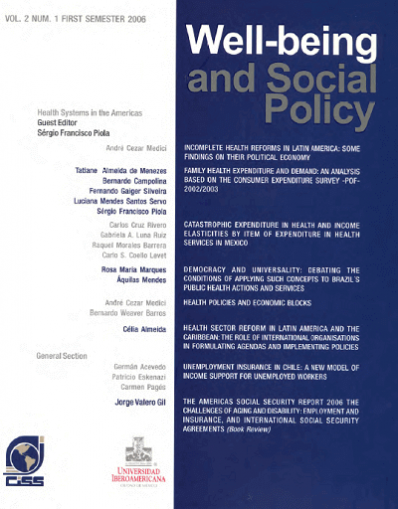
|
|
|
|

|
|
Financial development and the distribution of income in Latina America and the Caribbean
One of the central concerns in Latin America an the Caribbean (LAC) has been the reduction of poverty and inequality so prevalent in the continent. Using large world samples, the literature has found that financial development increases economic growth, increases the income of the poor, and reduces inequality. This paper studies the effects of financial development on the whole distribution of...
|
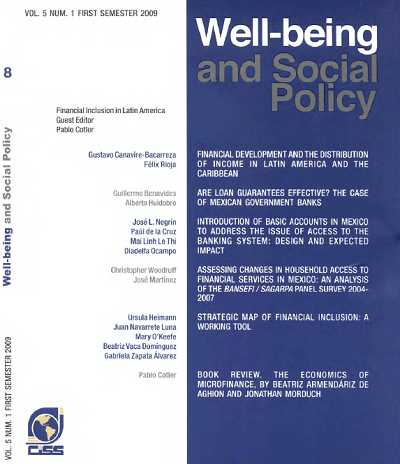
|
|
|
|

|
|
Book review. Informe de evaluación de la política de desarrollo social en México 2008, CONEVAL
The Evaluation Report on Social Development Policy in Mexico was published by the National Council for Social Development Policy Evaluation (CONEVAL) in 2008. The Council is one of the constituting elements of the new institutional framework to evaluate the public sector performance, particularly social development policies that were put in place mostly during the first decade of this century....
|
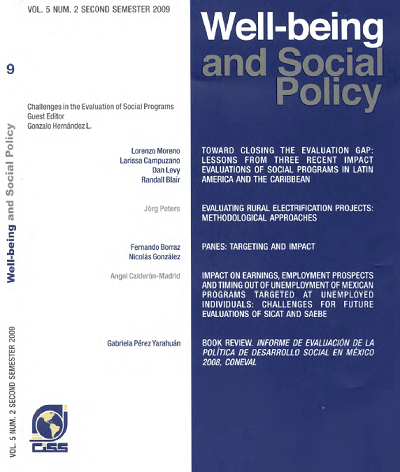
|
|
|
|

|
|
Impact on earning, employment prospects and timing out of unemployment of mexican programs targeted at unemployed individuals: challenges
his paper presents estimates of the impact of programs for unemployed workers on the performance of program beneficiaries in Mexico. We emphasize the significance of applying methodologies capable of avoiding statistical bias attributable to unobserved variables when measuring the impact on earnings and allowing to us properly estimate unemployment duration and work status after exiting from...
|
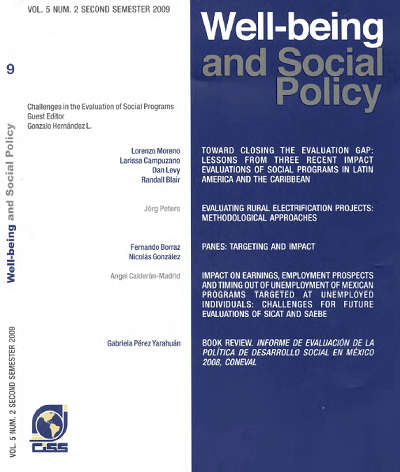
|
|
|
|

|
|
PANES: targeting and impact
This research paper intends to quantifit targeting performance in terms of the efficiency of the 1 National Plan for Social Emergency Assistance (PANES) implemented in Uruguay between 2005 and 2007 and determine its impact on relevant issues such as school attendance, child labor and the labor market. For this analysis , we used 2006 and 2007 Continual Household Survey (ECH) data.
Our outcomes...
|
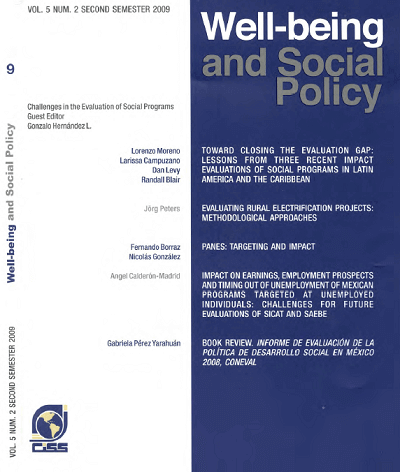
|
|
|
|

|
|
Evaluating rural electrification projects: methodological approaches
In recent years, the international community has expanded efforts in program evaluation to improve the accountability of development projects. This paper presents approaches to implementing state of the art evaluations in rural electrification projects, taking into account specific challenges that researchers face in such interventions. II suggests an approach to assess impacts before an...
|
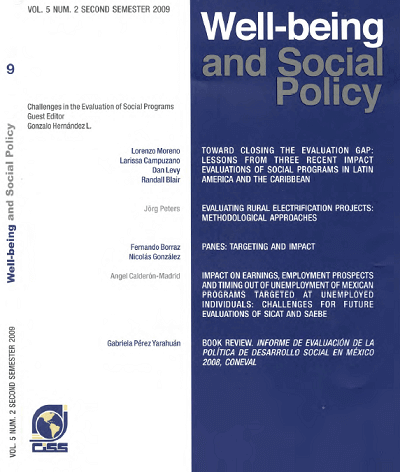
|
|
|
|

|
|
Toward closing the evaluation gap: lessons from three recent impact evaluations of social programs in Latin America and the Caribbean
Despite recent growing demand from funders and governments, rigorous impact evaluations in Latin America and the Caribbean remain the exception rather than the rule. Many commissioned impact evaluations are methodologically weak, and thus only marginally useful in assessing the impact of social interventions. Other impact evaluations feature strong research methodologies at their conception, but...
|
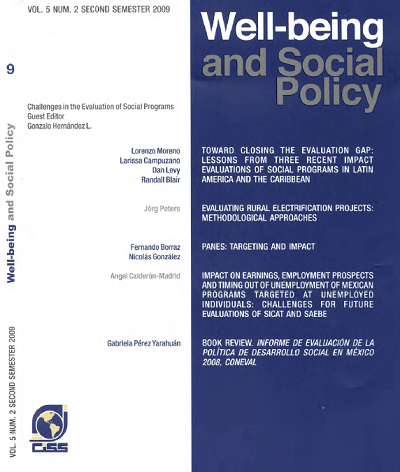
|
|
|
|

|
|
Book review. The economics of microfinance, by Beatriz Armendáriz de Aghion and Jonathan Morduch
The book by Armendáriz and Morduch focuses on how microfinance institutions work, what has been their impact and whether they are financially sustainable. For such purpose the book can be divided—from my viewpoint—into six sections. The first describes the environment of imperfect information that surrounds credit transactions and the consequences that this entails. First the authors define in a...
|
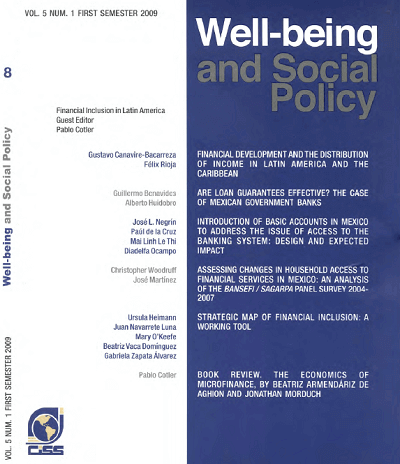
|
|
|
|

|
|
Strategic map of financial inclusion: a working tool
Various circumstances make difficult the rigorous study of processes, strategies and impact of V the efforts of financial inclusion and penetration, either at the academie level, in the public policy area or in companies and organizations of financial services industry. The central problem in Mexico has been the lack of a unified agreement on the definition and the low comprehension level of the...
|
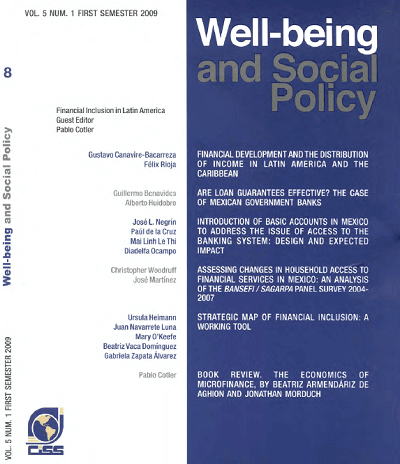
|
|
|
|

|
|
Assessing changes in household access to financial services in Mexico: an analysis of the BANSEFI/SAGARPA panel survey 2004-2007
In March 2004, BANSEFI and SAGARPA began a project to examine the impact on households I of the Program to Strengthen the Popular Credit and Savings Sector (Programa de Fortalecimiento del Sector de Ahorro y Crédito Popular), which was designed to help non-bank financial intermediaries to abide by the Ley de Ahorro y Crédito Popular (LACP), passed by the Mexican Congress in 2001. During the...
|
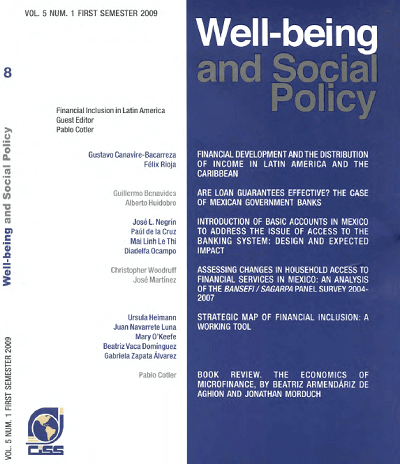
|
|
|
|

|
|
Introduction of basic accounts in Mexico to address the issue of access to the banking system: design and expected impact
This article presents the Mexican experience with the introduction of basic transaction accounts. Basic accounts are relatively cheap simple banking products with restricted functionality targeted at social groups that have limited access to transaction accounts. In Mexico, basic payroll accounts and accounts for the general public were introduced. By law, these products must be offered by all...
|
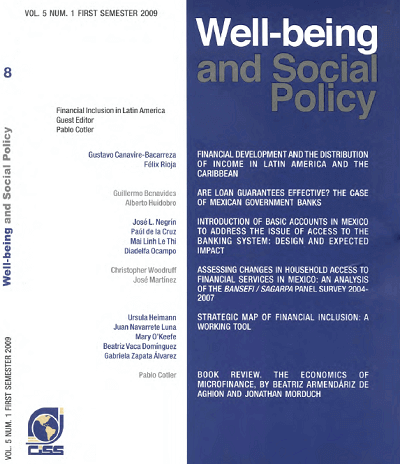
|
|
|
|

|
|
Are loan guarantees effective? The case of mexican government banks
Mexican Government’s Banks offer loan guarantees to private banks in order to spur credit directed to non-financial small and medium sized firms and this policy is examined here. Application of representative data to the comparative static analysis of the guarantee-use decision suggests that these schemes, as currently designed, are justifiable from an economic viewpoint. However, there is some...
|
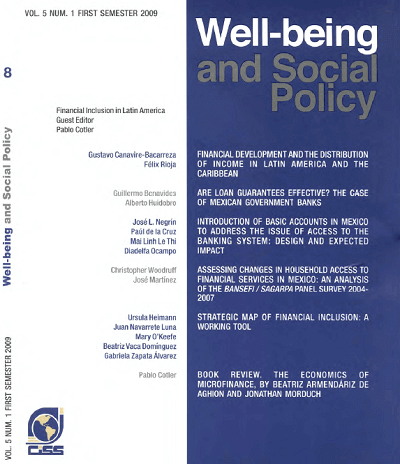
|
|
|
|

|
|
Book review. Beyond survival. Protecting households from health shocks in Latina America, by Baeza, Cristian C., y Truman G. Packard
The book by Cristian Baeza and Truman Packard is based on the next hypothesis: adverse health events reduce the consumption of goods and services different from health services, and many households become poor because of that. While the authors recognize that the evidence they present on the topic is limited, they propose the use of a “universal risk pool” as a way to eliminate the problem of...
|
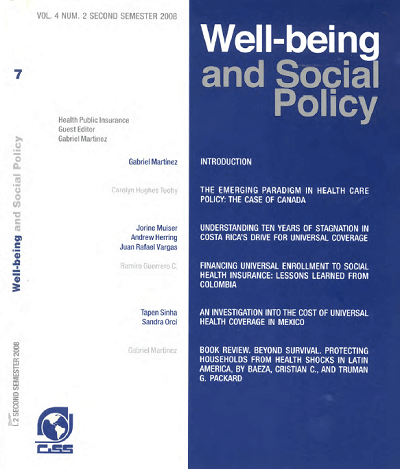
|
|
|
|
|